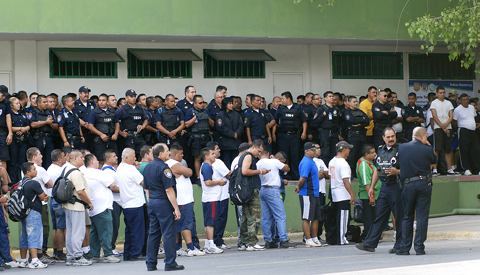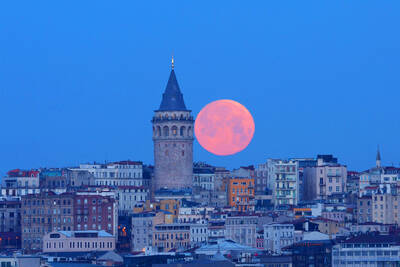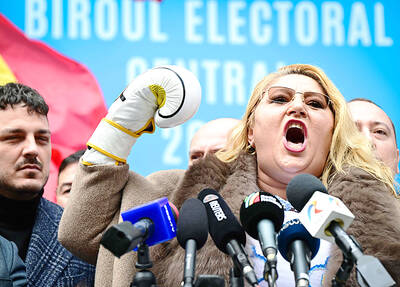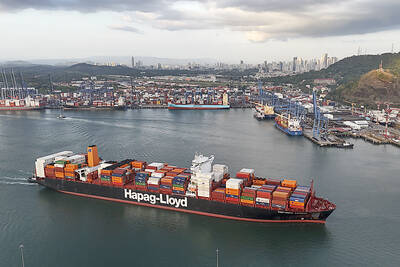Soldiers and federal agents detained 29 police officers in northern Mexico on Monday for alleged ties to drug traffickers.
It was Mexico’s latest sweep to root out corruption among police and government officials, which has been a major impediment to Mexican President Felipe Calderon’s battle against drug cartels. Last week, federal officials arrested 10 mayors and 20 other officials in the western state of Michoacan on suspicion of protecting La Familia cartel.
Soldiers and state and federal agents detained the 29 officers at police headquarters in the cities of Monterrey, San Nicolas de los Garza, Apodaca and the state public security offices, Nuevo Leon state district attorney Luis Carlos Trevino.

PHOTO: AP
The officers were detained after soldiers found evidence linking them to drug dealers who were arrested last month, the state government said in a statement. It did not give details on the evidence.
“We are working on cleaning up forces and this is one step of many that have to be taken to achieve that,” Trevino said.
Trevino said none of the 29 had been charged.
Outside of the state police headquarters, about 60 people who said they were relatives of the detained officers protested against military intrusion in police activities.
Calderon has sent more than 40,000 soldiers to battle drug trafficking across the country and acknowledged that corruption is pervasive among Mexican police at all levels.
Local law enforcement officials have followed the president’s lead and are increasingly relying on military officers to run their police departments.
On Monday, retired General Javier Aguayo took over as police chief for the northern city of Chihuahua, where drug-fueled violence has claimed hundreds of lives.
In the nearby city of Ciudad Juarez, gunmen opened fire in the lobby of a drug and alcohol rehabilitation center, killing five people on Sunday, Regional Deputy Attorney-General Alejandro Pariente said. Witnesses told police many of the 50 rehab patients climbed a fence to flee the attack.
Pariente said police were investigating whether Sunday’s attack was related to threats that administrators had received demanding they shut down the clinic.
It was the second shooting attack in six months at a rehab clinic in Ciudad Juarez, a city across the border from El Paso, Texas.
The city had seen a decline in drug violence since more than 5,000 extra troops were sent in to bolster security in February.
The killings capped a bloody weekend that left more than 30 people dead. Among the victims were a lawyer, a university professor and a female police officer who was shot to death after leaving work.

RARE EVENT: While some cultures have a negative view of eclipses, others see them as a chance to show how people can work together, a scientist said Stargazers across a swathe of the world marveled at a dramatic red “Blood Moon” during a rare total lunar eclipse in the early hours of yesterday morning. The celestial spectacle was visible in the Americas and Pacific and Atlantic oceans, as well as in the westernmost parts of Europe and Africa. The phenomenon happens when the sun, Earth and moon line up, causing our planet to cast a giant shadow across its satellite. But as the Earth’s shadow crept across the moon, it did not entirely blot out its white glow — instead the moon glowed a reddish color. This is because the

Romania’s electoral commission on Saturday excluded a second far-right hopeful, Diana Sosoaca, from May’s presidential election, amid rising tension in the run-up to the May rerun of the poll. Earlier this month, Romania’s Central Electoral Bureau barred Calin Georgescu, an independent who was polling at about 40 percent ahead of the rerun election. Georgescu, a fierce EU and NATO critic, shot to prominence in November last year when he unexpectedly topped a first round of presidential voting. However, Romania’s constitutional court annulled the election after claims of Russian interference and a “massive” social media promotion in his favor. On Saturday, an electoral commission statement

Chinese authorities increased pressure on CK Hutchison Holdings Ltd over its plan to sell its Panama ports stake by sharing a second newspaper commentary attacking the deal. The Hong Kong and Macau Affairs Office on Saturday reposted a commentary originally published in Ta Kung Pao, saying the planned sale of the ports by the Hong Kong company had triggered deep concerns among Chinese people and questioned whether the deal was harming China and aiding evil. “Why were so many important ports transferred to ill-intentioned US forces so easily? What kind of political calculations are hidden in the so-called commercial behavior on the

‘DOWNSIZE’: The Trump administration has initiated sweeping cuts to US government-funded media outlets in a move critics said could undermine the US’ global influence US President Donald Trump’s administration on Saturday began making deep cuts to Voice of America (VOA) and other government-run, pro-democracy programming, with the organization’s director saying all VOA employees have been put on leave. On Friday night, shortly after the US Congress passed its latest funding bill, Trump directed his administration to reduce the functions of several agencies to the minimum required by law. That included the US Agency for Global Media, which houses Voice of America, Radio Free Europe and Asia and Radio Marti, which beams Spanish-language news into Cuba. On Saturday morning, Kari Lake, a former Arizona gubernatorial and US